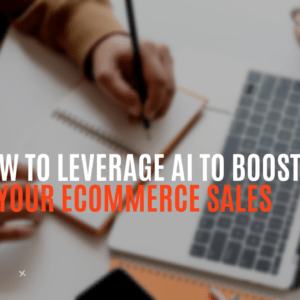Introduction:
AI and eCommerce are transforming the way businesses attract, engage, and retain customers. With AI, online stores are becoming more personalized, efficient, and customer-centric. In this blog, we’ll explore how AI technologies can enhance your eCommerce operations—from automating tasks and improving customer experience to optimizing marketing strategies. Whether you’re running a small online store or a large marketplace, you’ll find actionable insights to skyrocket your sales.
Table of Contents
The Role of AI in Modern eCommerce
AI, or artificial intelligence, refers to the simulation of human intelligence by machines. In eCommerce, AI tools analyze vast amounts of data, predict trends, and help businesses make smarter decisions. Let’s explore key areas where AI plays a crucial role:
- Personalization: AI customizes customer experiences by analyzing behavior and preferences.
- Inventory Management: AI forecasts demand and helps prevent stockouts or overstocking.
- Chatbots: AI-powered chatbots assist customers instantly, improving engagement and conversions.
- Dynamic Pricing: AI adjusts prices based on market trends and competition.
These technologies ensure eCommerce businesses operate smarter and faster—giving them a competitive edge.

How AI Enhances Personalization in eCommerce
Personalization has become a game-changer in the eCommerce world. Shoppers expect more than just a product; they want a personalized experience. AI and eCommerce combine to deliver tailored experiences based on data insights.
1. Product Recommendations
AI analyzes purchase history, browsing patterns, and preferences to recommend products that align with customers’ interests. This enhances cross-selling and upselling opportunities.
Example:
Amazon’s “Customers who bought this also bought” feature is a prime example of AI-powered recommendations driving additional purchases.
2. Personalized Email Campaigns
AI tools create targeted email campaigns by analyzing customer behavior. Sending the right message to the right person at the right time increases engagement and conversion rates.

How AI Automates Customer Support with Chatbots
AI chatbots are revolutionizing customer service. These virtual assistants are available 24/7, ensuring quick and efficient responses to customer queries.
1. Instant Problem Resolution
Customers get immediate answers without having to wait for a human representative, improving satisfaction and loyalty.
2. Personalized Conversations
AI chatbots learn from previous interactions, allowing them to offer personalized responses and product suggestions. This makes customers feel valued and increases the chances of conversion.
Pro Tip:
Integrate chatbots on your website and social media channels to capture leads and reduce cart abandonment.

AI-Powered Inventory Management: Never Run Out of Stock
Inventory management can make or break an eCommerce business. AI ensures you always have the right products available, eliminating stock shortages and overstock issues.
1. Demand Forecasting
AI analyzes market trends, seasonal changes, and historical data to predict demand. This helps you stock popular items in advance and avoid losing sales due to stockouts.
2. Real-Time Inventory Tracking
AI-powered tools provide real-time visibility into stock levels, ensuring smooth operations. Alerts notify you of low inventory, helping you replenish stock promptly.

Boost Conversions with AI-Driven Pricing Strategies
Pricing plays a crucial role in influencing customer decisions. AI takes dynamic pricing to a whole new level by continuously adjusting prices based on factors like competitor pricing, demand, and customer behavior.
1. Dynamic Pricing
AI tools ensure your product prices stay competitive, helping you attract more customers without sacrificing profit margins.
Example:
Ecommerce giants like Amazon use dynamic pricing to stay ahead of competitors by adjusting prices in real-time.
2. Personalized Discounts
AI identifies customers likely to respond to special offers and sends personalized discount codes, increasing the likelihood of purchase.

Using AI for Smarter Marketing Campaigns
Marketing is the backbone of any eCommerce business. AI enables businesses to create targeted campaigns that yield higher returns on investment (ROI).
1. Predictive Analytics
AI predicts customer behavior, helping you launch campaigns at the most effective times. For example, sending an email right when a customer is most likely to open it improves conversion rates.
2. Audience Segmentation
AI tools segment your audience based on demographics, interests, and buying habits, ensuring your campaigns resonate with the right people.
3. Ad Optimization
AI-powered platforms like Google Ads use machine learning to optimize your ad campaigns. They automatically adjust bids, targeting, and placements to maximize ROI.

Enhancing Customer Experience with Visual Search
AI-driven visual search is changing how customers find products online. Instead of typing keywords, shoppers can upload images to search for similar products, improving the overall shopping experience.
Example:
Pinterest’s visual search tool allows users to find products from images, simplifying the buying journey.
AI and Voice Commerce: The Future is Here
Voice commerce is gaining popularity with the rise of virtual assistants like Alexa, Google Assistant, and Siri. AI enables customers to search for products and make purchases using voice commands, offering convenience and speed.
Pro Tip:
Optimize your eCommerce store for voice search by using natural language in product descriptions and meta tags.

How to Implement AI in Your eCommerce Store
Integrating AI doesn’t have to be complicated. Here are a few practical steps to get started:
1. Identify Areas for Improvement
Analyze your business and pinpoint areas where AI can create the most impact, such as customer service, pricing, or marketing.
2. Choose the Right AI Tools
Select AI tools that align with your business goals. Popular platforms include:
- Chatbot tools: ChatGPT, Tidio
- Recommendation engines: Dynamic Yield, Nosto
- Inventory management: NetSuite, Skubana
3. Monitor and Optimize
AI is not a one-time solution. Continuously monitor the performance of AI tools and fine-tune them to achieve optimal results.
The Future of AI and eCommerce: What to Expect
The future of AI and eCommerce looks bright. With rapid technological advancements, we can expect even more innovative solutions. Here’s what lies ahead:
- Augmented Reality (AR) Integration: Shoppers can visualize products in real environments before purchasing.
- AI-Generated Content: Product descriptions and marketing copy created by AI tools will become more sophisticated.
- Hyper-Personalization: AI will predict customer needs even before they realize them.
Staying ahead of these trends will help businesses maintain a competitive edge and continue to grow.

Conclusion: Unlock Your eCommerce Success with AI
AI and eCommerce are a powerful combination. From personalized experiences and automated customer support to optimized pricing and smarter marketing, AI can boost your sales and enhance customer satisfaction. Implementing AI tools might seem overwhelming at first, but starting small and scaling gradually can yield remarkable results.
Businesses that embrace AI early will be better positioned to thrive in a highly competitive market. So, start leveraging AI today and watch your eCommerce sales soar!


Add a Comment